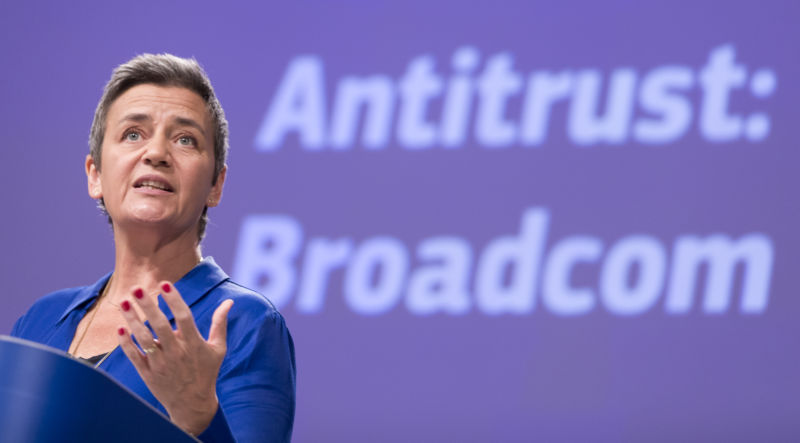
European regulators have hit chipmaker Broadcom with a rare “interim” restriction on its behavior as their antitrust probe into the company’s alleged abuse of its market power deepens.
Broadcom was ordered immediately to stop applying and enforcing “anticompetitive provisions” in its dealings with six major customers, the European Commission’s competition bureau said.
The order has to do with exclusivity agreements. Such agreements by suppliers are considered anticompetitive because they lock a dominant company into continued dominance. Exclusivity deals prevent would-be competitors from accessing any customers of their own, thus preventing their meaningful entry into the marketplace. In short: if nobody is allowed to buy from you, because they’re forced to buy from the bigger company, then you can’t sell anything, and your new business flops.
The EU has “strong indications” that Broadcom is behaving anticompetitively, said competition bureau head Margrethe Vestager. “Broadcom’s behavior is likely, in the absence of intervention, to create serious and irreversible harm to competition. We cannot let this happen.”
The company is Europe’s dominant provider of systems-on-a-chip for TV set-top boxes, fiber modems, and xDSL modems, the competition bureau said. The exclusivity clauses in its contracts not only grant it continued dominance in those markets but also “allow Broadcom to leverage its dominance into the market for cable modem chipsets in which Broadcom may not yet be dominant,” thus squeezing out the only other supplier of those chips.
The EU’s investigation of Broadcom began in June. The interim measures were imposed on a prima facie basis—legalese for something that looks to break the relevant law at first sight before a deeper probe reveals any more layers to the case. Essentially, Broadcom is now under an injunction preventing it from doing certain things while the EU’s investigation continues.
The Broadcom case marks the first time since 2001 that the EU has imposed interim measures on any company, The Wall Street Journal said.
Feel like you’ve seen this before?
Rival US chipmaker Qualcomm, which makes mobile phone chipsets, has of late been facing its own antitrust challenges, and the charges levied against it are very similar to the allegations against Broadcom.
The Federal Trade Commission in May won a suit it filed in 2015 against Qualcomm. The suit claimed that the company abused its monopolistic market position to overcharge nearly all mobile phone device makers for cellular chips—even if the manufacturers used another supplier.
Over the years, Qualcomm used its patent portfolio and market power to lock mobile device makers—including Apple, BlackBerry, Samsung, Motorola, and others—into deals that heavily favored it. The device manufacturers were required to agree to license Qualcomm’s patents, at very high fees, before they could purchase Qualcomm chips. Qualcomm also signed agreements with the device makers that would pay back rebates for every device sold with a Qualcomm wireless chip—but only if the handset maker sold only devices with Qualcomm chips. Qualcomm effectively held hundreds of millions of dollars hostage to exclusivity. (It is no coincidence that Apple acquired Intel’s wireless modem business earlier this year.)
EU regulators also launched two antitrust investigations into Qualcomm in 2015. The first, dealing with exclusivity payments, resulted in a $1.1 billion fine against Qualcomm in 2018. The second, dealing with predatory pricing, ended in July of this year with a $268 million fine.
Media reports earlier this year indicated that an investigation by the FTC into Broadcom’s behavior is also growing. The agency is reportedly probing whether Broadcom abused its market dominance by requiring customers to sign exclusivity deals—the exact same conduct at the heart of the FTC’s Qualcomm case.
Birds of a feather…
The past few years have proven tumultuous for Broadcom and Qualcomm both, and their strange stories have at times woven together. Increasing antitrust scrutiny from US and EU regulators has put pressure on the companies from one side, while increasing trade hostilities between the US and China have put pressure on them from another.
Broadcom spent months trying and failing to acquire rival Qualcomm in what turned out to be something of a high-stakes farce. In November 2017, Broadcom made an unsolicited $103 billion offer, which Qualcomm refused. Broadcom then took steps toward initiating a hostile takeover, which Qualcomm also pushed back against.
In February 2018, Broadcom tried the carrot instead of the stick and upped its bid to about $122 billion. Qualcomm again said “no.” (That offer was conditioned on Qualcomm either abandoning its own bid for rival NXP, which Qualcomm then raised its offer for and continued to pursue. The deal collapsed ingloriously for China trade-war reasons.)
In a brazen act of corporate negging, Broadcom then revised its bid for Qualcomm again. This time, the company reduced its bid to $117 billion, which Qualcomm—you guessed it—rejected. And yet, despite no actual deal ever having existed between Broadcom and Qualcomm, US President Donald Trump in March of last year signed an executive order prohibiting the companies from joining forces for nebulous national security reasons.
Had that deal not been scuttled both by Qualcomm’s unwillingness to pursue it and by the White House’s action, it would likely have invited a great deal of international antitrust scrutiny and landed the companies in more or less exactly the hot water they’re in now.
https://arstechnica.com/?p=1586485

